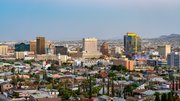Article
Shredding kiosk protects trees and IDs
An idea born from identity theft, The Shred Stop destroys documents while promoting recycling and sustainability.

April 12, 2013 by Natalie Gagliordi — Editor of KioskMarketplace.com, Networld Media Group
When someone tells you to make the best out of a bad situation, it can seem like one of those concepts that are easier to preach than to practice. But in the case of Navy officer turned entrepreneur Stephen Hershman, he was actually able to turn his lemons into lemonade.
Hershman had an unlucky run-in with identity theft that compromised his top-level security clearance as a communications officer for the U.S. Navy. The frustration from the experience caused Hershman to have his aha moment and set out on a new mission — one that aims to protect both your credit score and the environment.
Hershman is now the president and director of engineering for the Lynnwood, Wash.-based The Shred Stop, a company he co-founded that offers DIY shredding via self-service kiosks. In addition to paper, the kiosk also shreds old floppy discs and CDs, all for a charge of $2.50 per minute of shredding.
And in true Pacific Northwest fashion, the earth-friendly kiosk promotes recycling and sustainability through its paper disposal practices and a partnership with the National Forest Foundation.
Getting started
The journey from idea to prototype was not always smooth, as Hershman and his Shred Stop co-counder Keith Rettig discovered. The pair initially envisioned the shredding solution as a drive-thru outdoor building, but quickly realized the concept was a hard sell to their target locations — grocery stores.
"When we first talked to the people at Haggen's (a regional grocery chain), they said that they didn't put buildings in the parking lot," Hershman said.
The rejection prompted them to reimagine the outdoor solution as an in-store kiosk, and Hershman used his engineering skills to design and build a prototype, working with various manufacturers. When he approached Haggen's with the next iteration, they finally agreed to house the kiosk.
"When we got approved by Haggen's we thought, 'This is going to be so easy!' ... but it didn't turn out to be that way," Hershman said. "We didn't make the next sale to a store for three years."
Efforts to expand, go green
Things got a bit easier for Hershman and Rettig after realizing they needed trained professionals for sales and PR. The Shred Stop currently has 18 kiosks deployed in grocery stores around Seattle and Portland, Ore., but the effort has largely been bootstrapping and private investment.
"Our next big hurtle is raising capital," Hershman said. "Ideally we want to expand. Until this generation of kiosks was developed, I don't think we could have expanded much out of our reach, but now we are able to drop them in other places farther away and we can feel comfortable that they are going to be fine."
Hershman established a relationship with the global records management company Iron Mountain to collect the shredded paper from the kiosk, which when full contains upwards of 175 pounds of shredded paper, he said. The paper is compacted and recycled into toilet paper and other paper products.
Sustainability was always part of the idea, Hershman said. The kiosks are built using LED lighting and ultra-efficient electronics and are themselves more than 99-percent recyclable.
"We are recycling the old generation of the kiosk," he said. "All that can't be recycled out of a 1700-pound kiosk is a small pile."
But The Shred Stop goes beyond recycling with its recent partnership with the National Forest Foundation, a congressionally chartered non-profit to which Hershman donates $1 for every 10 pounds of paper recycled from the kiosks.
"We thought about what we could do to help out as a young company that is still trying to get funding. We looked at a lot of ideas and found the National Forest Foundation," said Hershman, adding that in addition to the donation, they also give kiosk users the opportunity to donate to the cause.
"It adds to the experience of recycling," he said.
The Shred Stop is supporting NFF's newest Treasured Landscapes conservation campaign site in the Pacific Northwest: the Majestic Methow on the Okanogan-Wenatchee National Forest. The project includes wilderness and backcountry habitat restoration, forest restoration and invasive plant removal, trail restoration and maintenance to support sustainable recreational use and wildlife enhancement.
"The Shred Stop has been fantastic to work with," said Kathleen Dowd-Gailey, Northwest regional director for the NFF. "It is helping us reach a broader audience by sharing the message of restoration and the NFF with their customers and also by allowing them to contribute. That is a huge help to us in communicating."
But how long will people have a paper trail?
With the movement to electronic records, banking and tax filing, it's common knowledge that more people are going digital and using less paper. But Hershman isn't deterred by the outlook.
"We have to deploy quickly," he said. "We aren't looking at a Redbox-type of deployment. We will never need that kind of density."
Hershman was hesitant to give his ideal deployment figure, but put it in the range of 5,000 to 10,000 nationwide.
"Our goal has been to get to where we are expanding and people are broadly aware of us," he said. "Home shredders don't last long at all. We want to get to a point to where people never have to buy another home shredder."
Read more about kiosk design.










